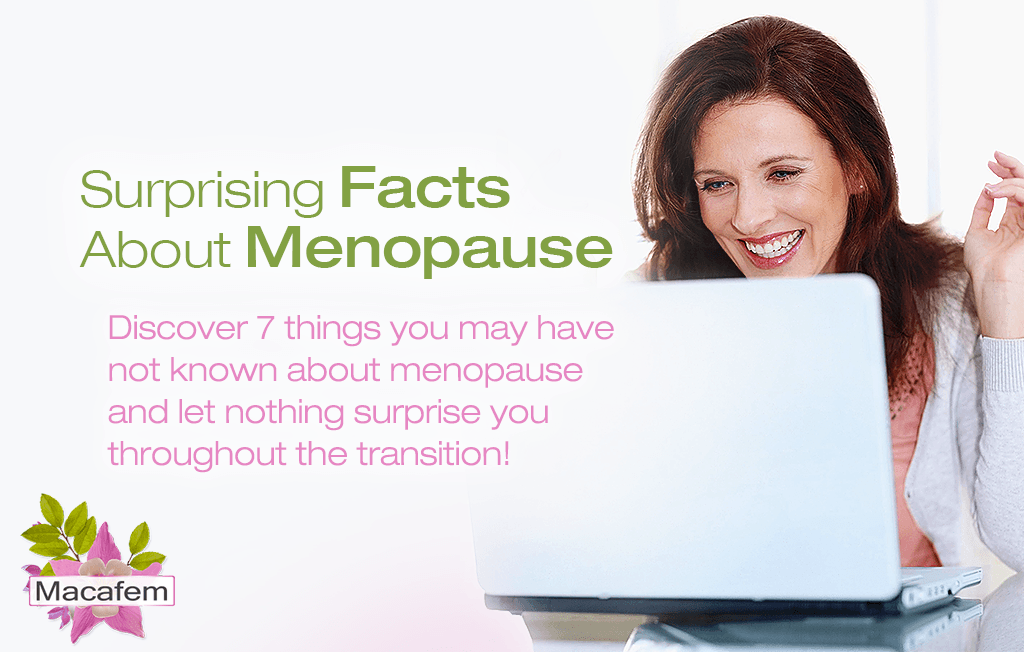7 Surprising Facts About Menopause
If there was one thing that makes entering menopause more difficult than it already is, it would be the amount of misleading information out there. But the more you educate yourself, the more prepared you’ll be to take on anything that menopause may throw at you. So, discover 7 surprising facts about menopause, and let nothing surprise you throughout the transition.

Menopause Is Not Diagnosed with Clinical Tests
Many middle-aged women are surprised that they aren’t prescribed tests to confirm they’re menopausal. Indeed, doctors usually determine their menopausal status based on age, experienced symptoms, and lack of periods. To make it more interesting, up until recently, there were no menopause tests available on the market.
In some cases, a doctor would order a blood test to check reproductive hormone levels. Recently, a vaginal pH test was approved to help women better orient themselves as they go through the transition.
Not Only Middle-Aged Women Go Through Menopause
For most women, menopause is a mid-life change, with 51 being the average age at which women reach it. However, a small percentage of women go through the transition at a younger age. When it occurs between 40 and 45, it’s called early menopause. When it happens before the age of 40, it’s labeled premature menopause.
Science is unclear about what determines menopause age. Possible factors include family history, smoking, reproductive history, and certain chronic conditions, among others.
You Can Get Pregnant during Perimenopause
After skipping a period for a few months, some middle-aged women may assume their reproductive years have come to an end. Nothing could be farther from the truth. Although fertility in a woman’s 40s is lower than it used to be, she’s not officially menopausal until she misses her period for 12 months in a row. That means she can still get pregnant.
While this may be reason for caution for most perimenopausal women, for those still wanting to get pregnant naturally, it’s a sign of hope. Once menopausal, women can still get pregnant through IVF.
Many Doctors Are Not Trained in Menopause
A 2019 survey of resident doctors revealed what could easily be every menopausal woman’s biggest fear: 93.2% of them felt inadequately prepared to manage women during menopause. Another survey of OB/GYN residents showed that only 20% received formal training in menopause.
That’s why it’s so important to be an educated patient, do your research, ask thorough questions, and seek a doctor who has the knowledge and experience to guide you through the midlife changes.
Symptoms May Last for Years After Menopause
Undoubtedly, postmenopause brings relief from many of the intense perimenopause symptoms. However, most women still report some degree of discomforts for a few years or – in some cases – for over a decade. The most notorious symptoms persisting into postmenopause are hot flashes, vaginal dryness, insomnia, and more.
What’s even more important than residual symptoms are new health risks that postmenopausal women face, like heart disease and osteoporosis. Annual check-ups will help you keep an eye on potential complications.
Your Sex Life is Not Over after Menopause
It’s no secret that the hormonal shifts in a woman’s body can cause discomforts that make intimacy challenging. These include vaginal dryness, low libido, and painful sex. While these changes are legitimate obstacles, many women successfully work towards overcoming them and reviving their sex life after menopause.
Vaginal lubricants can reduce friction and pain during sex. Pelvic floor muscle exercises will boost blood flow to the vaginal walls and strengthen them. Practicing self-love and acceptance may help you enjoy sex more freely.
You Can Relieve Symptoms Naturally Without HRT
Overwhelmed with intense symptoms, women may be desperate for relief, even if it involves taking hormone-replacement therapy (HRT). While very effective, HRT has been linked to serious health risks. Luckily, relieving symptoms naturally is not only possible, but also not that difficult. And Macafem sets you up for success!
Its unique blend of beneficial compounds gives the endocrine glands a helping hand, easing hormonal deficits and putting a stop to feeling dreadful. Plus, it’s virtually free of side effects.
Being in the know about menopause is the best way to prepare yourself for the upcoming changes and tackle them with strength and positivity. This can make a huge difference not only in your experiences during the transition, but also your health for years to come.
Mayo Clinic Proceedings. (2019). Menopause Management Knowledge in Postgraduate Family Medicine, Internal Medicine, and Obstetrics and Gynecology Residents: A Cross-Sectional Survey. Retrieved August 8, 2022, from https://pubmed.ncbi.nlm.nih.gov/30711122/
Office on Women's Health. (2021). Menopause and sexuality. Retrieved August 8, 2022, from https://www.womenshealth.gov/menopause/menopause-and-sexuality
Johns Hopkins Medicine. (2013). What do Ob/Gyn in Training Learn About Menopause? Not Nearly Enough, New Study Suggest. Retrieved August 8, 2022, from https://www.hopkinsmedicine.org/news/media/releases/what_do_obgyns_in_training_learn_about_menopause_not_nearly_enough_new_study_suggests
Journal of Mid-Life Health. (2014). Vaginal pH: A marker for menopause. Retrieved August 8, 2022, from https://www.ncbi.nlm.nih.gov/pmc/articles/PMC3955044/

